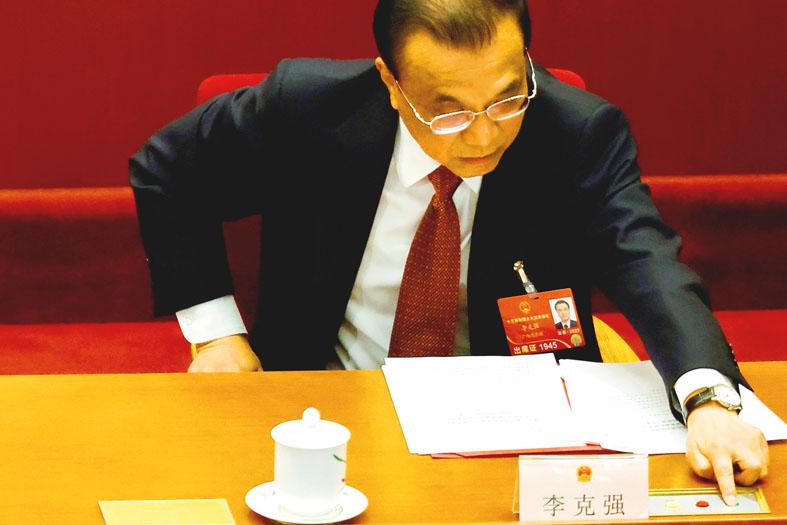China has announced another stimulus measure to finance infrastructure projects, part of its push to drive investment and increase employment in the second half of this year as the economy starts to recover from the effects of COVID-19 lockdowns.
The government will raise 300 billion yuan (US$44.8 billion) to finance infrastructure projects by selling financial bonds and other methods, the State Council chaired by Chinese Premier Li Keqiang (李克強) decided on Wednesday, according to a report by Xinhua news agency.
Those bonds are usually sold by policy banks. The money will be used to replenish the capital of major projects such as new types of infrastructure, the statement on Thursday said.

Photo: Reuters
These types of financial tools can help “expand effective investment, drive employment and facilitate consumption,” and allow China to stick to its stance of “not flooding the economy with stimulus or over-printing money,” the meeting concluded.
This would help banks achieve a better match between their loans and deposits, and improve the transmission of monetary policy, it said.
Infrastructure projects are a key factor in determining how fast the economy can grow in the remaining six months of this year, as other sources of growth, such as housing and private consumption, are still slowing. Chinese President Xi Jinping (習近平) last month pledged to strive to meet economic targets for the year, although Beijing’s “zero COVID” strategy has caused analysts to cut their forecasts for annual growth to levels far below the official goal of about 5.5 percent.
The new stimulus can in theory leverage as much as 1.2 trillion yuan in credit from the banking sector and capital markets, based on the government requirement that the money should be at least 20 percent of overall investment, Nomura Holdings Inc economists including Lu Ting (陸挺) said.
However, its impact in reality could be much smaller, and would not be enough to plug an estimated 6 trillion yuan funding gap that the government has to fill if it wants to carry out its proactive fiscal policy, they wrote in a note yesterday.
Local authorities are under huge financial stress this year due to the cost of COVID-19 controls and tax cuts, as well as a slump in land sales that reduced a key source of revenue.
The new money is in addition to the 800 billion yuan the three policy banks were told last month to lend for infrastructure projects. That loan quota has already been allocated to the policy banks, local newspaper the 21st Century Business Herald reported yesterday, citing sources it did not identify.
Separately, China’s Caixin/Markit manufacturing purchasing managers’ index rose to 51.7 last month from 48.1 in May, marking the first expansion in four months. That was well above analysts’ expectations for an uptick to 50.1.
The Caixin survey, which focused on more export-oriented and small firms in coastal regions, follows official data showing the country’s factory and service sectors snapped three months of activity decline last month.
Additional reporting by Reuters

Taiwanese suppliers to Taiwan Semiconductor Manufacturing Co. (TSMC, 台積電) are expected to follow the contract chipmaker’s step to invest in the US, but their relocation may be seven to eight years away, Minister of Economic Affairs J.W. Kuo (郭智輝) said yesterday. When asked by opposition Chinese Nationalist Party (KMT) Legislator Niu Hsu-ting (牛煦庭) in the legislature about growing concerns that TSMC’s huge investments in the US will prompt its suppliers to follow suit, Kuo said based on the chipmaker’s current limited production volume, it is unlikely to lead its supply chain to go there for now. “Unless TSMC completes its planned six

Intel Corp has named Tasha Chuang (莊蓓瑜) to lead Intel Taiwan in a bid to reinforce relations between the company and its Taiwanese partners. The appointment of Chuang as general manager for Intel Taiwan takes effect on Thursday, the firm said in a statement yesterday. Chuang is to lead her team in Taiwan to pursue product development and sales growth in an effort to reinforce the company’s ties with its partners and clients, Intel said. Chuang was previously in charge of managing Intel’s ties with leading Taiwanese PC brand Asustek Computer Inc (華碩), which included helping Asustek strengthen its global businesses, the company

Power supply and electronic components maker Delta Electronics Inc (台達電) yesterday said second-quarter revenue is expected to surpass the first quarter, which rose 30 percent year-on-year to NT$118.92 billion (US$3.71 billion). Revenue this quarter is likely to grow, as US clients have front-loaded orders ahead of US President Donald Trump’s planned tariffs on Taiwanese goods, Delta chairman Ping Cheng (鄭平) said at an earnings conference in Taipei, referring to the 90-day pause in tariff implementation Trump announced on April 9. While situations in the third and fourth quarters remain unclear, “We will not halt our long-term deployments and do not plan to

TikTok abounds with viral videos accusing prestigious brands of secretly manufacturing luxury goods in China so they can be sold at cut prices. However, while these “revelations” are spurious, behind them lurks a well-oiled machine for selling counterfeit goods that is making the most of the confusion surrounding trade tariffs. Chinese content creators who portray themselves as workers or subcontractors in the luxury goods business claim that Beijing has lifted confidentiality clauses on local subcontractors as a way to respond to the huge hike in customs duties imposed on China by US President Donald Trump. They say this Chinese decision, of which Agence